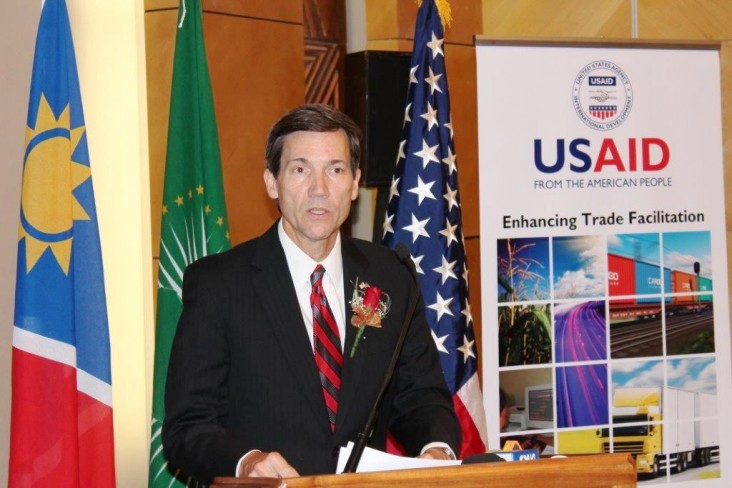
New Namibia Online Information Portal Breaks Down Barriers to Trade
For Immediate Release
Windhoek --- The U.S. government, in partnership with Namibia’s Ministry of Finance and Namibia’s Customs & Excise, launched a powerful new tool to increase and facilitate cross-border trade. The “Namibia Trade Information Portal” is a web-based platform that provides an authoritative “one-stop shop” of readily accessible trade, customs and compliance information. It is designed to significantly reduce the time and effort required for local and international traders to access current information and documentation required for doing business. The portal is the culmination of many years of collaboration between government of Namibia agencies and ministries and the U.S. government, working through the U.S. Agency for International Development (USAID) Southern Africa Trade Hub Project.
Distinguished representatives of the Ministry of Finance, Namibia Customs & Excise, and the U.S. Embassy joined private sector and civil society organizations to celebrate the July 22, 2015, launch at the Windhoek Country Club. U.S. Ambassador to the Republic of Namibia Thomas Daughton told the gathering, “This crucial trade facilitation tool is an example of a Namibian solution to improve Namibian commerce – brought to fruition with the assistance of the United States.”
“We believe that improving trade flows in southern Africa is essential to promoting economic growth, creating jobs, and increasing the standard of living for hardworking Namibians – from the truck drivers who ferry goods across borders to the farmers and manufacturers who are generating Namibian exports. Namibia is in an ideal position to capitalize on the region’s vast potential,” Daughton said.
In his keynote address, Minister of Finance Calle Schlettwein said that the Trade Portal reflects the commitment of the Namibian government to build a “robust, knowledge-based society” through various modernization projects. However, he cautioned that the portal must be kept up-to-date if it is to be sustainable and relevant.
“For this reason, I strongly appeal to my fellow and counterpart ministers to designate focal points in their ministries who shall administer and avail timely updates, preferably online transmission of such information to our designated team in the Ministry of Finance who will, in turn, keep the portal updated,” Schlettwein said.
Following the formal remarks, guests were invited to try the trade portal for themselves, using laptops provided on-site. DeeDee du Toit, Walvis Bay Users’ Association (WBUA), called the trade portal “a dream come true.”
“I cannot begin to explain how much easier having this information available at the click of a button will make things, for us and our clients. It is a breakthrough for Namibian trade and will give us a competitive edge,” she said.
The Namibia Trade Information Portal is an important step toward realizing a larger goal - developing a “National Single Window” for Namibia. A National Single Window is an online tool that would allow any individual or business involved in trade and transport to submit all of the required paperwork electronically via a single online site. Other countries that have implemented a National Single Window have succeeded in reducing customs processing from days to less than 90 seconds.
Background on the organizations: The U.S. Agency for International Development (USAID) is leading the U.S. government's efforts to end extreme poverty and promote resilient, democratic societies around the world. The American people, through USAID, have provided economic and humanitarian assistance worldwide for over 50 years and for over 25 years in the Republic of Namibia. As a primary implementing agency of PEPFAR in Namibia, USAID provides technical assistance to local programs to ensure sustainability and strengthen country ownership. For more information, visit www.usaid.gov.
USAID’s Southern Africa Trade Hub provides targeted technical assistance to governments, the private sector and civil society organizations to advance regional trade within Southern Africa. The hub’s work throughout the region increases international competitiveness, intra-regional trade and food security in Southern Africa. In Southern Africa, trade costs significantly constrain trade-based growth, limit product diversification, and increase the price of consumer goods, including food. In an effort to help reduce the time and costs of importing and exporting, the trade hub is promoting several modern trade facilitation tools throughout Southern Africa and assisting in their adoption, including the Trade Information Portal and National Single Window. www.satradehub.org







Comment
Make a general inquiry or suggest an improvement.